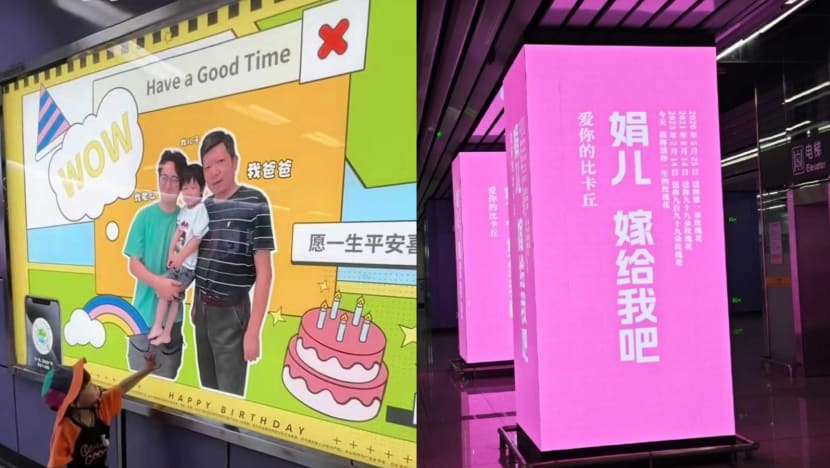Ad billboards at Chinese metro networks become blank spaces for commuters to propose marriage, search for jobs
Keen to take out an advertisement on Guangzhou Metro for birthday greetings or a marriage proposal? Rates start from 380 yuan (US$52) for three days.

Personalised advertisements such as birthday wishes (right) and marriage proposals (left) on China's subway networks have become popular. (Photos: Bilibili/xiaoashenbb, Weibo/zimu-qd)

This audio is generated by an AI tool.
SINGAPORE: More Chinese subway operators are boosting revenue by letting commuters buy billboard ads to make marriage proposals, wish their loved ones a happy birthday or look for a job.
Guangzhou Metro launched its service in January with the aim of diversifying ad revenue streams and engaging commuters.
A customer recently took out an ad at Huangbian station on Line 2 of the subway to wish her father, husband and three-year-old son a happy birthday. Capturing the moment her father saw the ad, she posted a video on social media of him then glancing down and asking: “Is my stomach that big?”
Subway operators in Beijing, Hefei, Zhengzhou and Chengdu have since come on board, according to local media reports.
Last month, Qingdao Metro in Shandong province announced that individuals would be able to buy ad space for purposes such as anniversaries, job searches, and even for their pets.
Individuals may place their orders on the Qingdao Metro advertising mall’s mini programme on WeChat. A check by CNA showed there have been 16 orders of ads on a 3m by 1.5m lightbox, offered at a discounted price of 699 yuan (US$96) for four weeks.
Guangzhou Metro’s ad buying service can also be accessed through a mini programme on WeChat. Rates start from 380 yuan (US$52) for three days, and individuals may choose the subway line they would like the ad to appear on.
Speaking to news site Sixth Tone, Ms Li Jing, a manager at the Guangzhou Metro Media Company, said the goal was to “foster deeper connections with passengers” and “bolster the appeal of subway advertising”.
She did not disclose the number of personal-ad orders the company has received since January, but said “dozens” of bookings are received daily due to growing online popularity.
The new revenue stream helps prop up Guangzhou Metro’s bottomline at a time when ad revenue has declined for three years, according to Sixth Tone.
According to the news site Workers’ Daily, Guangzhou Metro has seen its monthly revenue increase by 20 per cent since offering its personalised ad service.
With such ads becoming more popular, subway companies have issued guidelines.
Ads that run on the Guangzhou Metro must comply with China’s advertising laws. For example, they must not hurt the feelings of minors or people with disabilities, and must not contain anything that impersonates others.
Information provided should be "truthful, accurate and complete", and pictures provided must qualify for fair use, the operator said.
Qingdao Metro has reminded customers that the content of ads should be "legal" and must not be "vulgar".
People featured in the ads should be "properly clothed" and should not reveal their "shoulders, back and thighs", the operator added.















